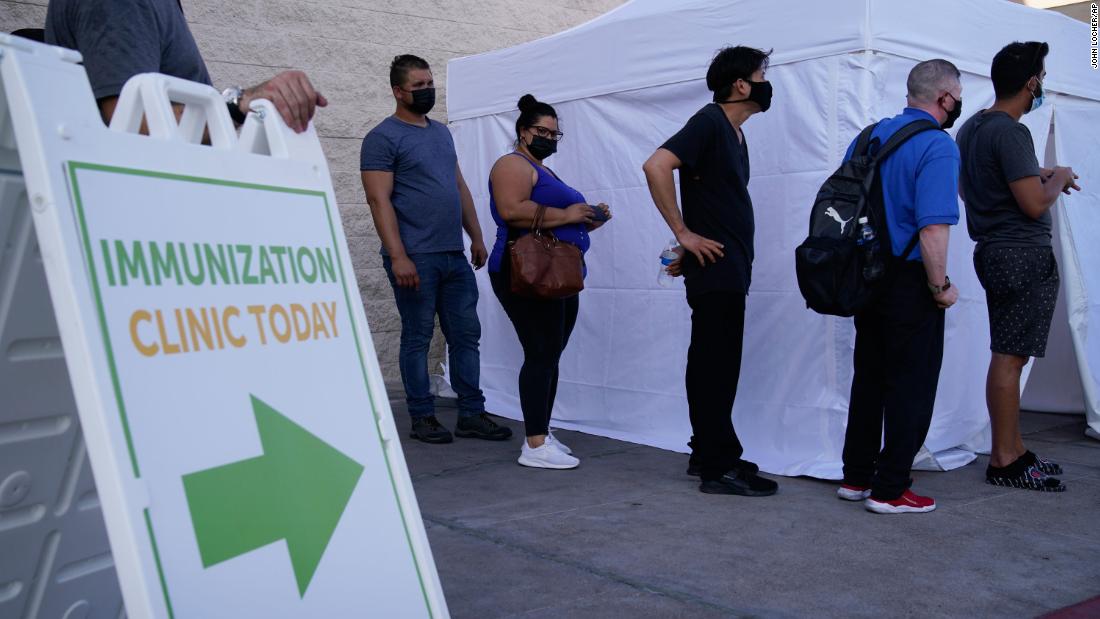
"We can't have it both ways; we can't be both unmasked and non-socially distant and unvaccinated. That won't work," Dr. Jonathan Reiner, a CNN medical analyst and professor of medicine and surgery at George Washington University, said Monday.
Covid-19 cases rose a sharp 47% over the past week as the more transmissible Delta variant spread, but not all communities were impacted equally.
About a third of the nation's cases came out of five states, Florida, Louisiana, Arkansas, Missouri and Nevada, Reiner said. And impacts were felt most among the unvaccinated. Of all the deaths from the virus in June, more 99% were among unvaccinated people, Dr. Rochelle Walensky, director of the US Centers for Disease Control and Prevention, said.
"We have to pick sides and the side is we need to be vaccinated," Reiner said. "We have the tools to put this down -- we can put it down this summer -- but the way to do that is vaccination."
To get more Americans vaccinated, officials will need to address the reasons behind some of the population's hesitancy.
For some, it is that the vaccines have not been fully approved, which Dr. Anthony Fauci, director of the National Institute of Allergy and Infectious Diseases, told CNN is only a matter of time. And for some, political divide has inhibited vaccinations, but Reiner emphasized that with more than 600,000 Americans dead, it is the virus that should be seen as the enemy, not vaccines.
In Arkansas, which has one of the lowest vaccination rates in the US at 35% according to CDC data, Little Rock Mayor Frank Scott Jr. said he, as a Black man, was skeptical of getting a vaccine, but now wants to lead the way to ensure all residents get the shot.
"It's serious and we should not have to allow someone to die for us to really believe the research and science. What we continue to do is go by data driven policies and research and all that we do in our administration, and this is just another way to continue to do that because, again, this saves lives," said Scott.
'Nothing changed' after Pfizer booster meeting
Federal health officials met with vaccine maker Pfizer/BioNTech Monday to discuss if and when a booster shot for its Covid-19 vaccine might be needed.
Pfizer presented data to federal health officials for about an hour, suggesting boosters may soon be needed to sustain Covid-19 protection, but Fauci told CNN after the meeting, "Nothing has really changed."
He said based on the present data, federal health agencies, like the CDC and US Food and Drug Administration, are not ready to recommend a booster.
"We made it very clear that their data is part of a much larger puzzle," Fauci told CNN's Chris Cuomo.
The meeting came after Pfizer said last week it is seeing waning immunity from its coronavirus vaccine and is picking up its efforts to develop a booster shot to protect people from variants.
Pfizer emphasized in a statement Monday that it will be publishing "more definitive data in a peer-reviewed journal and continuing to work with regulatory authorities to ensure that our vaccine continues to offer the highest degree of protection possible."
The message Fauci hopes the public will take away from the meeting, he said, is that discussion of boosters does not mean current vaccines are not offering sufficient protection against the virus.
"What we are talking about is not necessarily how good they are, because they are unquestionably terrific," he said. "It's the durability of the response that's in question, which is a perfectly reasonable thing when you are dealing with a vaccine.
"We don't know how long that extraordinarily high degree of protection is going to last and that's what we're talking about."
Boosters aren't recommended now, but that doesn't mean they will not at some point be advised for the entire population or for specific, vulnerable groups, he said.
For example, Dr. Peter Hotez, dean of the National School of Tropical Medicine at Baylor College of Medicine, said Monday it was surprising that there was no discussion during the briefing about boosters for immunocompromised people.
A 'tidal wave' coming toward unvaccinated Americans
The rate of infection among unvaccinated Americans is so much higher, CNN Medical Analyst Sanjay Gupta said Monday, that America will soon more from a divide between vaccinated and unvaccinated populations to vaccinated and infected.
Dr. Howard Jarvis, an emergency medicine physician in Springfield, Missouri, told CNN on Monday that his sick patients are all unvaccinated.
"If they're sick enough to be admitted to the hospital, they are unvaccinated. That is the absolute common denominator amongst those patients," he said. "I can see the regret on their face. You know, we ask them, because we want to know, are you vaccinated? And it's very clear that a lot of them regret (not being vaccinated)."
In St. Louis County, Missouri, officials said new cases have increased by 63% over the past two weeks, and County Executive Sam Page said, "a tidal wave is coming towards our unvaccinated populations."
Covid-19 related hospital admissions rates increased by 36% over the past two weeks in the St. Louis metro area, according to a report from the St. Louis County Public Health Department.
"This variant is spreading quickly, and this variant has the ability to devastate those in its wake, and that is why it is so critical to get vaccinated now," Page said.
"choice" - Google News
July 13, 2021 at 02:09PM
https://ift.tt/3wBp57N
Americans need to make a choice in order to avoid a Covid surge, expert says - CNN
"choice" - Google News
https://ift.tt/2WiOHpU
https://ift.tt/3c9nRHD
Bagikan Berita Ini














0 Response to "Americans need to make a choice in order to avoid a Covid surge, expert says - CNN"
Post a Comment